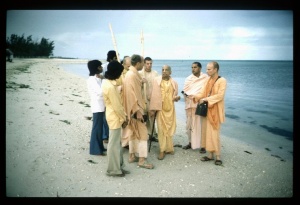BG 10.17: Difference between revisions
m (1 revision(s)) |
(Vanibot #0020 edit - link to the Version Compare feature) |
||
| Line 1: | Line 1: | ||
{{ | [[Category:Bhagavad-gita As It Is (1983+) - Chapter 10]] | ||
<div style="float:left">'''[[Bhagavad-gita As It Is (1983+)]] - [[BG 10 (1983+)|Chapter 10: The Opulence of the Absolute]]'''</div> | |||
<div style="float:right">[[File:Go-previous.png|link=BG 10.16]] '''[[BG 10.16]] - [[BG 10.18]]''' [[File:Go-next.png|link=BG 10.18]]</div> | |||
{{CompareVersions|BG|10.17|BG 1972|BG 1983+}} | |||
{{RandomImage}} | |||
==== TEXT 17 ==== | ==== TEXT 17 ==== | ||
<div class="devanagari"> | |||
:कथं विद्यामहं योगिंस्त्वां सदा परिचिन्तयन् । | |||
:केषु केषु च भावेषु चिन्त्योऽसि भगवन्मया ॥१७॥ | |||
</div> | |||
<div | <div class="verse"> | ||
:kathaṁ vidyām ahaṁ yogiṁs | |||
:tvāṁ sadā paricintayan | |||
:keṣu keṣu ca bhāveṣu | |||
:cintyo 'si bhagavan mayā | |||
</div> | </div> | ||
==== SYNONYMS ==== | ==== SYNONYMS ==== | ||
<div class="synonyms"> | |||
<div | ''katham''—how; ''vidyām aham''—shall I know; ''yogin''—O supreme mystic; ''tvām''—You; ''sadā''—always; ''paricintayan''—thinking of; ''keṣu''—in which; ''keṣu''—in which; ''ca''—also; ''bhāveṣu''—natures; ''cintyaḥ asi''—You are to be remembered; ''bhagavan''—O Supreme; ''mayā''—by me. | ||
</div> | </div> | ||
==== TRANSLATION ==== | ==== TRANSLATION ==== | ||
<div class="translation"> | |||
<div | |||
O Kṛṣṇa, O supreme mystic, how shall I constantly think of You, and how shall I know You? In what various forms are You to be remembered, O Supreme Personality of Godhead? | O Kṛṣṇa, O supreme mystic, how shall I constantly think of You, and how shall I know You? In what various forms are You to be remembered, O Supreme Personality of Godhead? | ||
</div> | </div> | ||
==== PURPORT ==== | |||
= | <div class="purport"> | ||
As it is stated in the previous chapter, the Supreme Personality of Godhead is covered by His ''yoga-māyā''. Only surrendered souls and devotees can see Him. Now Arjuna is convinced that His friend, Kṛṣṇa, is the Supreme Godhead, but he wants to know the general process by which the all-pervading Lord can be understood by the common man. Common men, including the demons and atheists, cannot know Kṛṣṇa, because He is guarded by His ''yoga-māyā'' energy. Again, these questions are asked by Arjuna for their benefit. The superior devotee is concerned not only for his own understanding but for the understanding of all mankind. So Arjuna, out of his mercy, because he is a Vaiṣṇava, a devotee, is opening for the common man the understanding of the all-pervasiveness of the Supreme Lord. He addresses Kṛṣṇa specifically as ''yogin'' because Śrī Kṛṣṇa is the master of the ''yoga-māyā'' energy, by which He is covered and uncovered to the common man. The common man who has no love for Kṛṣṇa cannot always think of Kṛṣṇa; therefore he has to think materially. Arjuna is considering the mode of thinking of the materialistic persons of this world. The words ''keṣu keṣu ca bhāveṣu'' refer to material nature (the word ''bhāva'' means "physical things"). Because materialists cannot understand Kṛṣṇa spiritually, they are advised to concentrate the mind on physical things and try to see how Kṛṣṇa is manifested by physical representations. | |||
</div> | |||
<div | <div style="float:right; clear:both;">[[File:Go-previous.png|link=BG 10.16]] '''[[BG 10.16]] - [[BG 10.18]]''' [[File:Go-next.png|link=BG 10.18]]</div> | ||
__NOTOC__ | |||
</div> | __NOEDITSECTION__ | ||
__NOTOC__ | |||
Revision as of 19:00, 7 December 2017

A.C. Bhaktivedanta Swami Prabhupada
TEXT 17
- कथं विद्यामहं योगिंस्त्वां सदा परिचिन्तयन् ।
- केषु केषु च भावेषु चिन्त्योऽसि भगवन्मया ॥१७॥
- kathaṁ vidyām ahaṁ yogiṁs
- tvāṁ sadā paricintayan
- keṣu keṣu ca bhāveṣu
- cintyo 'si bhagavan mayā
SYNONYMS
katham—how; vidyām aham—shall I know; yogin—O supreme mystic; tvām—You; sadā—always; paricintayan—thinking of; keṣu—in which; keṣu—in which; ca—also; bhāveṣu—natures; cintyaḥ asi—You are to be remembered; bhagavan—O Supreme; mayā—by me.
TRANSLATION
O Kṛṣṇa, O supreme mystic, how shall I constantly think of You, and how shall I know You? In what various forms are You to be remembered, O Supreme Personality of Godhead?
PURPORT
As it is stated in the previous chapter, the Supreme Personality of Godhead is covered by His yoga-māyā. Only surrendered souls and devotees can see Him. Now Arjuna is convinced that His friend, Kṛṣṇa, is the Supreme Godhead, but he wants to know the general process by which the all-pervading Lord can be understood by the common man. Common men, including the demons and atheists, cannot know Kṛṣṇa, because He is guarded by His yoga-māyā energy. Again, these questions are asked by Arjuna for their benefit. The superior devotee is concerned not only for his own understanding but for the understanding of all mankind. So Arjuna, out of his mercy, because he is a Vaiṣṇava, a devotee, is opening for the common man the understanding of the all-pervasiveness of the Supreme Lord. He addresses Kṛṣṇa specifically as yogin because Śrī Kṛṣṇa is the master of the yoga-māyā energy, by which He is covered and uncovered to the common man. The common man who has no love for Kṛṣṇa cannot always think of Kṛṣṇa; therefore he has to think materially. Arjuna is considering the mode of thinking of the materialistic persons of this world. The words keṣu keṣu ca bhāveṣu refer to material nature (the word bhāva means "physical things"). Because materialists cannot understand Kṛṣṇa spiritually, they are advised to concentrate the mind on physical things and try to see how Kṛṣṇa is manifested by physical representations.